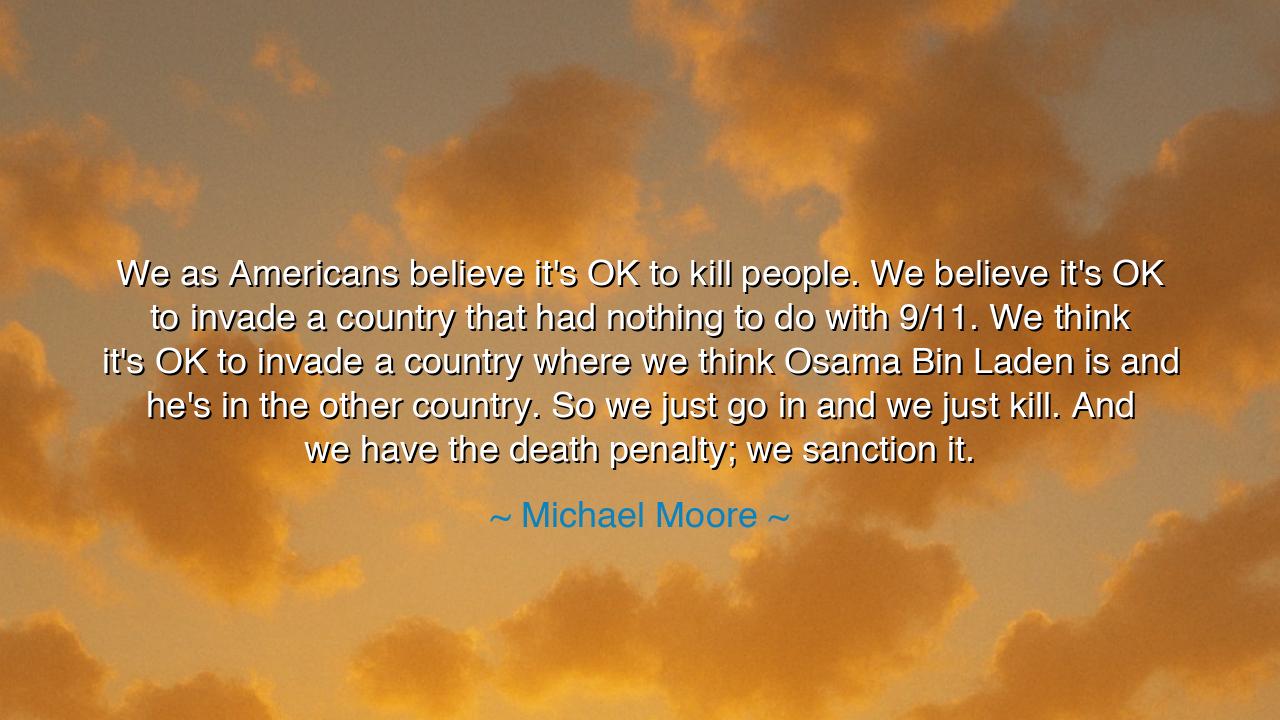
We as Americans believe it's OK to kill people. We believe it's
We as Americans believe it's OK to kill people. We believe it's OK to invade a country that had nothing to do with 9/11. We think it's OK to invade a country where we think Osama Bin Laden is and he's in the other country. So we just go in and we just kill. And we have the death penalty; we sanction it.






“We as Americans believe it’s OK to kill people. We believe it’s OK to invade a country that had nothing to do with 9/11. We think it’s OK to invade a country where we think Osama Bin Laden is — and he’s in another country. So we just go in and we just kill. And we have the death penalty; we sanction it.” — these are the words of Michael Moore, a modern critic of power and conscience, whose voice rose not from hatred, but from anguish and awakening. His words are not a condemnation of a people, but a mirror held up to a civilization — a call to look inward, to question the violence that has become woven into the fabric of national identity. It is a lament and a warning, spoken with the fire of truth and the sorrow of one who sees a great nation drifting from the light of its own ideals.
The ancients would have known such words well. For every empire, from Rome to Babylon, has faced the moment when it must ask itself: What have we become in our quest for strength? Power, once born from virtue, begins to turn upon itself when it forgets compassion. Moore’s quote exposes this very transformation — the slow erosion of moral sight, when killing becomes normalized, and righteousness becomes confused with revenge. The Republic that once prided itself on liberty and justice now finds its hands stained with the blood of those who never struck it. Like Rome in its decline, the empire of the modern age must ask: do we conquer for safety, or do we destroy to preserve illusion?
In the fires of September 11, 2001, a nation’s heart broke — and in its grief, it sought justice. But grief, untempered by wisdom, turns easily to wrath. Thus began the wars in Afghanistan and Iraq, where thousands died not for vengeance alone, but for fear, confusion, and the blind momentum of power. In his lament, Moore speaks of this — of a people who, believing themselves defenders of peace, have become instruments of destruction. The ancients would have seen this as a tragic cycle: the fall of compassion under the weight of pride. For no nation, however noble, can wield the sword endlessly and remain pure of spirit.
Consider the story of King Ashoka of India, conqueror of the Kalinga people. His armies slaughtered more than a hundred thousand souls. Yet when he walked among the ruins — when he saw the children crying beside their slain parents — his heart broke. In that moment, he renounced conquest and became a disciple of peace. He saw what Moore calls us to see: that violence breeds only emptiness, and that the greatness of a nation lies not in its might, but in its mercy. From that day forth, Ashoka spread the message of compassion throughout the world, proving that even kings may awaken from bloodshed.
Moore’s words also pierce deeper, into the soul of individual morality. “We have the **death penalty; we sanction it,” he says — and in that phrase lies a truth older than civilization: that when killing becomes lawful, conscience begins to die. The ancients debated this too — Socrates questioned the justice of punishment that mirrored the crime, and the prophets of Israel cried that vengeance belongs to God alone. The death penalty, like war, is humanity’s attempt to answer pain with pain — but such answers never heal. For in striking down the wicked, we risk becoming what we despise.
Yet this is not a message of despair, but of rebirth. Moore’s lament is not meant to condemn, but to awaken. It is a call to remember the sanctity of life, to reawaken the conscience buried beneath policy and pride. Each generation must rediscover what it means to be just, to be merciful, to be human. The ancients taught that the first duty of the citizen is not obedience to the state, but obedience to truth and virtue. And so, the modern citizen must rise again — not with weapons, but with wisdom, with empathy, and with the courage to speak when silence would be more convenient.
So let this teaching be carried forward: to kill without reflection is to lose one’s soul; to question violence is to begin healing. Do not be numb to the cries of those deemed “enemy” or “criminal.” Remember that behind every number is a face, behind every war a story, behind every death a spark of divine life. Let your patriotism not be the pride of domination, but the pride of compassion — the courage to stand for peace even when others call for blood. For the strength of a nation lies not in its armies, but in its heart. And only when that heart beats again with mercy will the world know true greatness.






AAdministratorAdministrator
Welcome, honored guests. Please leave a comment, we will respond soon